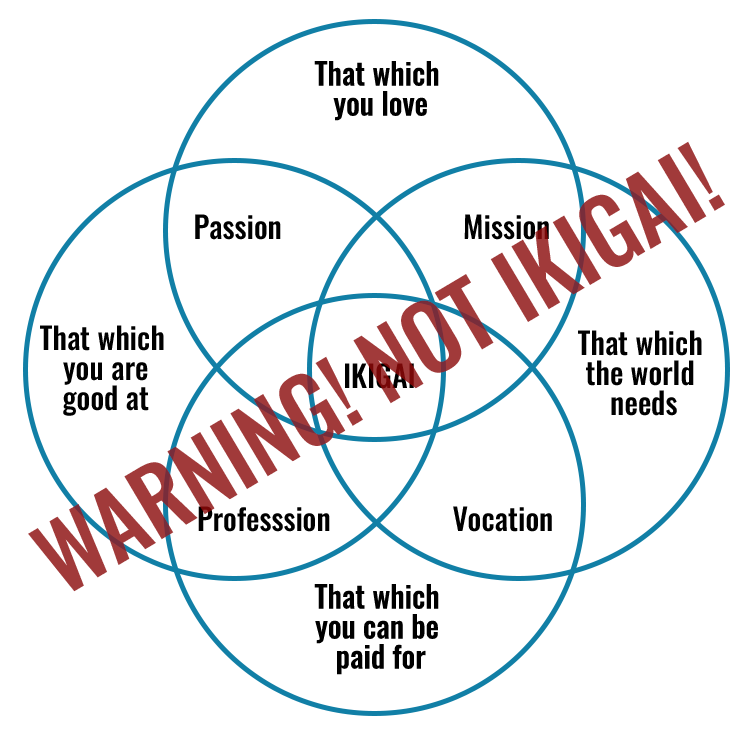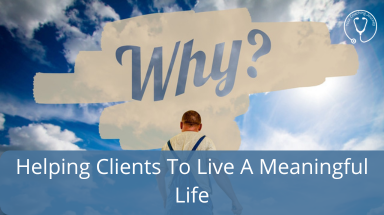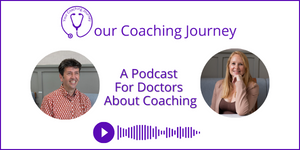Prefer to listen?
This blog post forms the basis of a podcast on our new coaching model, which you can listen to here.
We’ve spoken before about how some people think coaching is all about goals and the fact that whilst it can be, it’s often about more. You do sometimes see coachees, or clients who feel that there’s something missing and they want to lead a more fulfilled life.
Goals, of course can offer some meaning and purpose, the two concepts are not necessarily mutually exclusive.
The venn diagram, that’s often called ikigai but that we will refer to it as the meaningful purpose venn diagram (find out why here), explores how you could find meaning and purpose in the work that you do by finding what you can be paid for, what you’re good at, what you’re passionate about, and what the world needs.
Where these four things intersect is said to be where you will find your meaningful purpose. Many of our doctors, and a lot of allied healthcare professionals, will find that they have meaning in their work, they are in that spot in the diagram already. They might be frustrated by it, it might be impacted by things that are out of their control, but they will be good at what they do, they’ll love it, the world needs it and they’ll get paid for it.

Finding Your Passion… Again
A lot of people that come to our coaching programme and a lot of people that come into the coaching room are often there because the passion for their work is no longer there, they just don’t love it anymore, and they’ve lost the connection with why they went into medicine in the first place. As coaches, we can do good work in allowing people the time and space to explore that and what’s going on for them. It could be contextual, it could be the environment, but equally, it could be that they’ve ended up in medicine, without really intending to.
We always get people on our course, to talk about their journey to where they are now. And quite often people say something like ‘well, I wanted to be a vet, but then moved into medicine’. Or they did well at school and went to university, then done well at university and found their way into medicine without really thinking about it. Quite a few people we’ve met on our courses have a creative side to them and thought they might go down that route, but ended up in medicine, and really miss that part of them.
Equally, medical professionals may just be exhausted by it all. They might love their work, the world still needs it, they’re getting paid for it, but they might not be able to do as good a job as they want to do because of the constraints of the system. So, a ten minute consultation for a GP, for someone that’s really passionate about delivering a meaningful conversation about someone’s health, they might really struggle with that.
It’s useful when people are contemplating their occupation, to think about the meaningful purpose venn diagram, and whether those four things are being fulfilled. Or whether, all four actually do need to be fulfilled.
Doctors may well sacrifice the loving of the job for the fact that it’s quite well paid. Some people would say, ‘do I need to love my job? Is it possible? Should that be a consideration?’, and they might well carry on in the role they’re doing, because those other three elements are there.
Friedrich Nietzsche said,
“He who has a ‘Why’, can bear almost any ‘How’”
David Knott, who’s a surgeon, he wrote a book called the War Surgeon. He goes out to war torn countries and operate in really dire circumstances where hospitals are being bombed. He trains doctors now, and has a foundation that trains up surgeons in those countries so they can return and do that good work. So, there’s someone who’s putting himself at risk, is in harm’s way, in order to do what he sees as his meaningful purpose. And it doesn’t really matter to him that he’s in harm’s way. He suffers from PTSD and obviously there’s some trauma involved in what he’s doing, but he has that sense of purpose and loves what he does. So, if you have that purpose and you love what you do, then that’s often enough.
Lots of people who don’t need the income will volunteer. They have that sense of purpose that drives them to do something for the good of others. And they don’t need to be paid for it.
How To Spot This As a Coaching Topic
When someone comes into the coaching room, they may not necessarily outright say, I need to find more meaning in my life, but they might say something else like:
- I used to love my job,
- life’s just a bit boring or mundane,
- I don’t have a sense of direction,
- I feel as though I’m languishing a little bit.
That’s something to recognise in a coachee, if they’re just a bit lost, or don’t know where they want to go, meaning and purpose is worth exploring.
There’s the idea that’s reflected in Maslow’s hierarchy of needs, that initially we might need that need for food and shelter and security, and once we’ve established that and we’re okay, there’s often something else that, as humans, we need to fulfil. And for some people, for some of the time that might be focusing on their career, or it might be raising a family, or something else. And then when they’ve done that or they’ve achieved what they want to achieve, maybe the children have become more independent, they could again feel like there’s a missing part.
Carl Rogers and Abraham Maslow had the idea that we have that self-actualising tendency, we want to move on to something more, that we want to continue to improve and be our best selves. Sometimes, if we’re trapped in something that we’re not enjoying and not engaging with, then that can feel quite limiting. But we might have to do a lot of work on ourselves to find out what it is that we are wanting to move on to.
And that’s where coaching can help.
It’s important to mention that we don’t have to throw everything up in the air and change everything in our lives in order to feel that we have meaning and purpose. Some small things in your life can be tweaked, or some new perspectives gained, that allows you to feel you do have purpose, or to rediscover that meaning and purpose without making huge changes.
Where would you start?
Here are a few ideas of how you could work with a client on this topic.
Start with Why
Purpose and meaning may be a bit disconnected, but if we bring them together and have meaningful purpose, that’s powerful. Purpose can sometimes, especially within an occupation, be a goal, but it might not be meaningful for you. So we need to ask ‘what’s the meaning in the purpose that you’re working towards?’. That’s a good place to start.
Simon Sinek wrote a book called, ‘Start with why’. His idea was that everyone knows what they do, everyone knows how they do it, but very few people know why they do it. You would hope that the doctors know why they do it, but there might be that disconnect for them about what their meaningful purpose. What is it for them? And I think that can be a really deep and interesting conversation.
What sort of life do you want to lead?
In positive psychology, Martin Seligman talks about the three lives we can lead: the ‘pleasant life’ where we’re quite happy, we’re ticking along, we’re enjoying life, we’re having joyous moments in our day, and that might be okay for a while, and that tends to be a youthful thing that we just enjoy ourselves. But then we might get into a role where we’re actually engaged in our role and we have flow in our day. And that makes us happy, that would be the ‘good life’. But then if we desire to go beyond that, to live a ‘meaningful life’, then we have to start to explore what would actually give us meaning. For a lot of people, if we can explore what they do on a day-to-day basis in their work life, what parts of their job they get into that flow state in, when they can really just be engaged at work and come away feeling like they’ve done a good job, we might start to find that meaning.
What is the ultimate purpose?
If they’re doing a job they quite enjoy, but they don’t really understand the purpose of that job, that might be something that you can explore with them.
If you’re making widgets every day, but you’ve got no idea what the end use of those widgets are, you might not have a great sense of purpose about it. But if you knew those widgets were going into heart valves, something that had an ultimate impact on the world, then you might feel differently.
Organisations can go a long way to helping people to understand their purpose by connecting them with the end result of what it is they do. It’s perhaps about taking a different perspective, looking for where the purpose sits in what it is that they do.
Future visioning
If your client is languishing, it may be that you need to explore some future visioning, looking ahead to where they would like to be.
Values and cohesion
Some research has shown that having meaning in what you, having cohesion, in that what you do is in line with your values and makes sense in your life and also feeling significant, or that your work is significant, and therefore having some kind of impact, all give a sense of meaningful purpose. So, exploring and identifying a client’s values can be important, and to then ensure that those values are present and show up in their life will be useful coaching territory.
What would cause you to rise up?
Sometimes we can find some meaning in not just the things that we are passionate about, but the reverse, if you like, the things that we get frustrated by, because perhaps they indicate something that we’d like to change in the world. Some people, therefore, will find their meaning in the thing that grates, because if they can go out and make that grate less and make a difference in that way, they’ll feel that they have done well in their lives.
It’s not all work, work, work!
It could well be about other aspects of your life that give you meaning, rather than your work. The concept of finding your reason for being is not necessarily about the work you do. It could be about something else in your life, it could be your granddaughter, a pastime or hobby, making a podcast, or even training doctors.
This is a vast and nebulous topic, and purpose means, and is something different for everyone. We hope this has given you, as a coach, a bit of a taste of how you might work with someone around their meaningful purpose.
Meaning and purpose comes up alot in coaching, and work through this and other topics along with many other models and tools on our diploma programme. To find out more about our Doctors’ Transformational Coaching Diploma click through here



